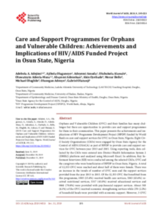Orphans and Vulnerable Children (OVC) and their families face many challenges but there are opportunities to provide care and support programmes for them in their communities. This paper presents the achievements and implications of HIV Programme Development Project (HPDP) funded by World Bank on care and support services for OVC in Osun State, Nigeria. Eight Civil Society Organisations (CSOs) were engaged by Osun State Agency for the Control of AIDS (OSACA) as part of HPDP to provide care and support services for OVC between year 2013 and 2015. Using reporting tools, data collected by the CSOs were entered into District Health Information System 2 (DHIS2) platform and analysed using Microsoft Excel. In addition, Key Informant Interviews (KII) were conducted among the selected CSOs, OVC and the caregivers who were beneficiaries of HPDP in Osun State, Nigeria. A total of 12,353 OVC were reached and about half of them were female. There was an increase in the trends of number of OVC seen and the support services provided from the year 2013 to 2015. Of the 12,353 OVC that benefitted from this programme, 1905 (15.4%) received health care services, 5383 (43.6%) received nutritional services, 5317 (43.0%) received educational services and 9861 (79.8%) were provided with psychosocial support services. About 503 (4.1%) of the OVC received economic strengthening services while 270 (2.2%) of household heads were provided with economic support. However, 3 OVC were lost to follow-up, 14 OVC voluntarily withdrew from the project and 6 OVC died. The FGD and KII revealed that the project was very impactful in transforming the lives of the OVC. Programmes for children orphaned and made vulnerable by HIV/AIDS will contribute to the achievement of HIV/AIDS prevention and control efforts. The HIV/AIDS free generation can be built by responding to the physical, social and mental needs of these children and their families in their communities. There is a need to scale-up this programme.

